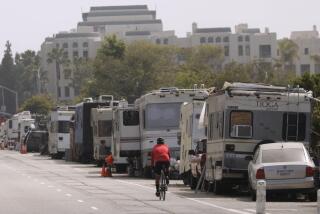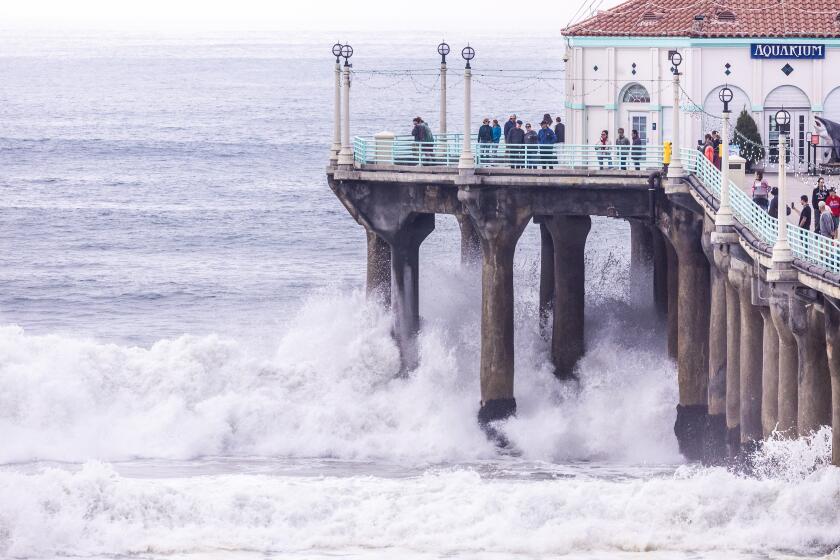Moving daze for RV dwellers
Eager to live in an upscale neighborhood without paying rent or buying a home, Remy Martin Foster said he hit on the perfect solution: He bought an RV.
“Mathematically it made the most sense,” the unemployed 29-year-old said. “It was the best financial move I ever made. I started saving money immediately.”
Trouble is, living in a vehicle on public streets is illegal. Ever since Foster began parking his camper on residential streets, first in Hollywood and then in the San Fernando Valley, the motor home dweller has been rousted from one spot to the next by annoyed neighbors and police.
Such was the case recently when a Studio City resident called the police and demanded that Foster clear out of her quiet cul-de-sac.
“We just don’t want this kind of thing coming here,” the woman told a reporter. Although she would not give her name, she said she has lived in the tree-lined neighborhood for 62 years and had only recently seen an RV take up residence there. She said she wasn’t about to tolerate an extended visit. “We just worry that once they start encroaching....”
In the last several years, neighborhoods in the San Fernando and Santa Clarita valleys have seen a 66% increase in the number of homeless people taking up residence in motor vehicles on public streets, while the rest of the county has experienced a drop of 65%, according to the Los Angeles Homeless Services Authority.
The trend, according to homeless advocates, is partly the result of strict enforcement programs instituted in other areas like Venice, and an economy that continues to struggle. They also say that the growing influx of mobile homeless points up a lack of social service programs in the valley areas and that friction between housed residents and the homeless will only continue to grow.
Homeless figures show “a disproportionate level of campers and RVs in 2011” in the San Fernando and Santa Clarita valleys, said Mark Silverbush, a policy and planning analyst for the homeless authority.
Foster, one of roughly 1,200 valley RV dwellers counted last year, said he doesn’t consider himself homeless, because he has shelter. Many other vehicle dwellers feel the same.
“It’s not the best thing,” said Michael Edward Huey, who lives with his wife, Maria, in a 32-foot Gulfstream RV on an industrial section of Saticoy Street in North Hollywood. But, he added, “I’ve got a roof over my head, I don’t have to pay rent.”
UCLA law school professor Gary Blasi, who has studied homeless issues in Los Angeles, said many of those struggling financially were bumping up the numbers of mobile homeless.
“The economy is still in depression mode for those on the lower end of the economic scale,” Blasi said. “For a lot of people, a vehicle is the last indoor space they’re going to see until they start hitting the shelters.”
Pete White, founder and co-director of Los Angeles Community Action Network, a group that advocates for homeless and low-income residents, said that although having permanent and stable housing was the preferred choice, living in an RV was “definitely a viable alternative” to homelessness.
“After Hurricane Katrina, the government said that living in a trailer or RV-type vehicle was indeed an option in an emergency situation,” White said.
“When we look at the current state of the economy ... we are definitely in an emergency situation.”
Huey said that when he and his wife started to park on Saticoy Street near Coldwater Canyon Avenue two years ago, their only curbside neighbor was “a guy living in his pickup truck.” Now at least half a dozen vehicle-homes hug the sidewalks nearby.
“Last couple of months you see more and more of them,” Huey said.
One of his neighbors is 73-year-old “Little” Kenny White, who lives down the street in a converted Toyota pickup and has hopes of finding housing someday. “I’m sick of living this way,” White said. But for now, he conceded, “it’s better than sleeping on the sidewalk.”
White was quick to point out that he was just someone who had fallen on hard times and was not involved with drugs. He is an Army veteran and onetime member of a group called Walter Ruiz and the San Fernando Sensations, featuring Kenny White.
He showed off photos of his glory days as a musician, when he dressed in a dapper red suit, had his hair slicked back and wore a broad smile.
People like White are not always welcome. Vehicle owners face regular police checks and must move their vehicles every 72 hours to comply with L.A. city parking regulations.
Foster, father of a year-old toddler who lives with her mother, said he believes the hostility stems from prejudice. He insists he isn’t a vagabond. His camper has wireless Internet access to keep him tuned in. He keeps motivated by reading a worn book of inspirational quotes by American author Napoleon Hill, best known for his self-help book “Think and Grow Rich.” And Foster owns a shiny black 2010 Toyota Camry, which he keeps parked behind the motor home.
“They just look down on me because I live in an RV,” Foster said. “I don’t cause any problems.”
Responding to complaints from neighbors in his Venice jurisdiction about a deluge of RV dwellers, L.A. City Councilman Bill Rosendahl spearheaded passage in 2010 of an ordinance that allows residents to request “no parking” signs on a block-by-block basis, prohibiting the overnight parking of oversize vehicles, such as RVs.
More than two dozen other cities, mainly L.A. County beach communities, have similar restrictions.
Rosendahl said new rules governing camper parking had resulted in a “dramatic decrease” in RV dwellers on the Westside. And through a “vehicles-to-home” program he helped implement last year with the nonprofit group People Assisting the Homeless, at least 30 participants have been moved from campers to apartments, Rosendahl said.
But some say that such crackdowns only cause the problem of homelessness to move.
Of the 250 RV dwellers who used to occupy Venice streets a couple of years ago, there were now fewer than 20 because of a law enforcement crackdown, said Steve Clare, executive director of the Venice Community Housing Corp., which helps low-income residents with low-cost housing options.
Many individuals saw their vehicles towed and impounded and couldn’t afford to get them back, Clare said. Others were ticketed and driven out of the community.
“They’re just parked in somebody else’s neighborhood now,” Clare said. “They’re just scattered ... with no support system and no help from the city or local residents.”
--
More to Read
Sign up for Essential California
The most important California stories and recommendations in your inbox every morning.
You may occasionally receive promotional content from the Los Angeles Times.











